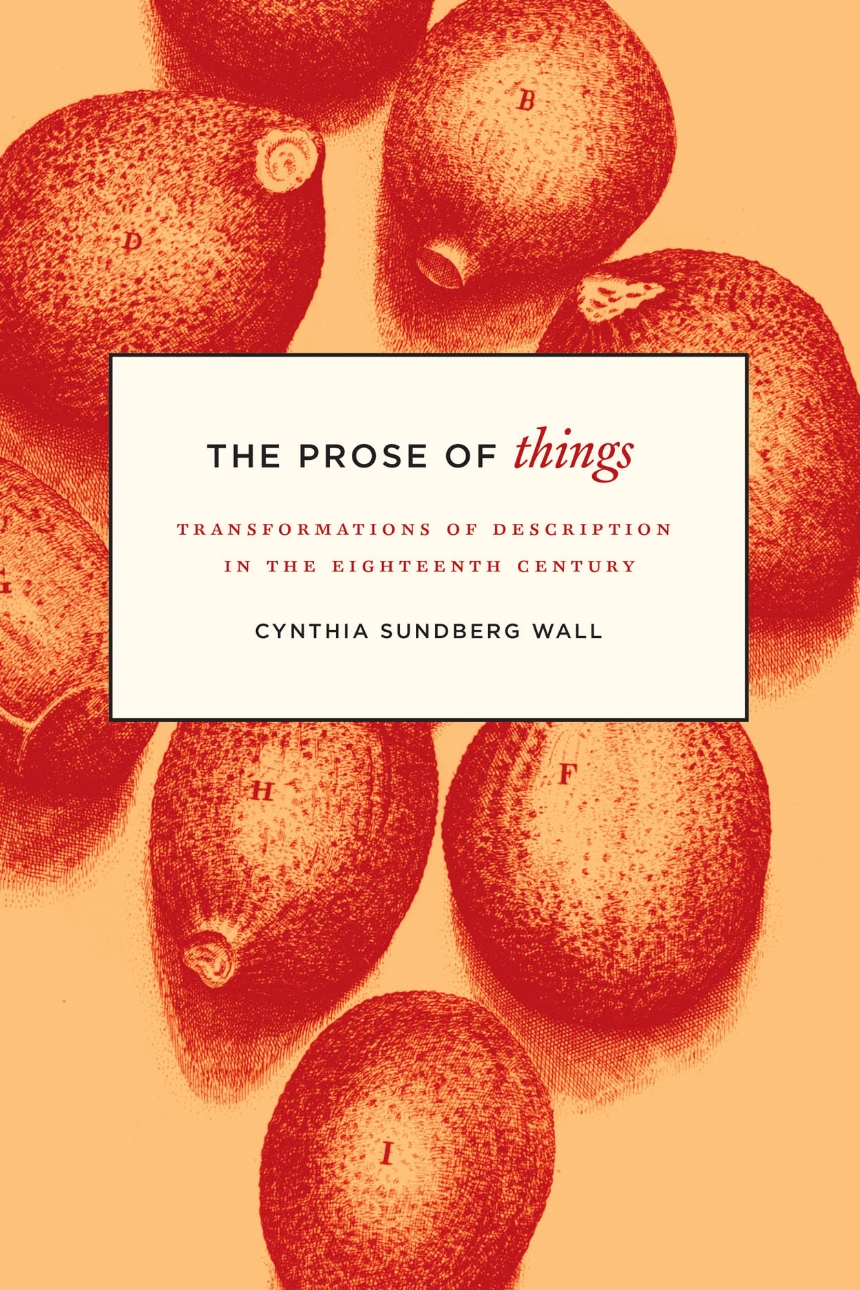The Prose of Things
Transformations of Description in the Eighteenth Century
9780226215273
9780226871585
9780226225029
The Prose of Things
Transformations of Description in the Eighteenth Century
Virginia Woolf once commented that the central image in Robinson Crusoe is an object—a large earthenware pot. Woolf and other critics pointed out that early modern prose is full of things but bare of setting and description. Explaining how the empty, unvisualized spaces of such writings were transformed into the elaborate landscapes and richly upholstered interiors of the Victorian novel, Cynthia Sundberg Wall argues that the shift involved not just literary representation but an evolution in cultural perception.
In The Prose of Things, Wall analyzes literary works in the contexts of natural science, consumer culture, and philosophical change to show how and why the perception and representation of space in the eighteenth-century novel and other prose narratives became so textually visible. Wall examines maps, scientific publications, country house guides, and auction catalogs to highlight the thickening descriptions of domestic interiors. Considering the prose works of John Bunyan, Samuel Pepys, Aphra Behn, Daniel Defoe, Samuel Richardson, David Hume, Ann Radcliffe, and Sir Walter Scott, The Prose of Things is the first full account of the historic shift in the art of describing.
In The Prose of Things, Wall analyzes literary works in the contexts of natural science, consumer culture, and philosophical change to show how and why the perception and representation of space in the eighteenth-century novel and other prose narratives became so textually visible. Wall examines maps, scientific publications, country house guides, and auction catalogs to highlight the thickening descriptions of domestic interiors. Considering the prose works of John Bunyan, Samuel Pepys, Aphra Behn, Daniel Defoe, Samuel Richardson, David Hume, Ann Radcliffe, and Sir Walter Scott, The Prose of Things is the first full account of the historic shift in the art of describing.
288 pages | 17 halftones | 6 x 9 | © 2006
Literature and Literary Criticism: British and Irish Literature
Reviews
Table of Contents
List of Illustrations
Acknowledgments
Introduction
1. A History of Description, a Foundling
Some Definitions of Description
The Rhetorical History of Description
2. Traveling Spaces
Descriptions and Excavations: Stow to Strype
Traveled Spaces: Ogilby, Bunyan
3. Seeing Things
Subspace and Surfaces: Hooke, Boyle, Swift
Diaries and Descriptions: Pepys and Evelyn
Collections and Lists: The Philosophical Transactions, Swift, Pope
4. Writing Things
Emblems: The Pilgrim’s Progress, Part II
Things (1): Defoe
Things (2): The Castle of Otranto
5. Implied Spaces
Spaces (1): Behn, Haywood, Aubin, Davys
Spaces (2): Pamela, Clarissa
6. Worlds of Goods
Worlds of Goods
Theories of Description
Shopping and Advertising
Auctions and Catalogs
7. Arranging Things
Furniture and Arrangements
Domestic Tours
Domestication
8. The Foundling as Heir
The Gothic: Reeve and Radcliffe
Historical Novels: Scott
Historiography: Hume and Gibbon
Afterword: Humphry Repton
Notes
Bibliography
Index
Acknowledgments
Introduction
1. A History of Description, a Foundling
Some Definitions of Description
The Rhetorical History of Description
2. Traveling Spaces
Descriptions and Excavations: Stow to Strype
Traveled Spaces: Ogilby, Bunyan
3. Seeing Things
Subspace and Surfaces: Hooke, Boyle, Swift
Diaries and Descriptions: Pepys and Evelyn
Collections and Lists: The Philosophical Transactions, Swift, Pope
4. Writing Things
Emblems: The Pilgrim’s Progress, Part II
Things (1): Defoe
Things (2): The Castle of Otranto
5. Implied Spaces
Spaces (1): Behn, Haywood, Aubin, Davys
Spaces (2): Pamela, Clarissa
6. Worlds of Goods
Worlds of Goods
Theories of Description
Shopping and Advertising
Auctions and Catalogs
7. Arranging Things
Furniture and Arrangements
Domestic Tours
Domestication
8. The Foundling as Heir
The Gothic: Reeve and Radcliffe
Historical Novels: Scott
Historiography: Hume and Gibbon
Afterword: Humphry Repton
Notes
Bibliography
Index
Awards
Modern Language Association of America: James Russell Lowell Prize
Honorable Mention
